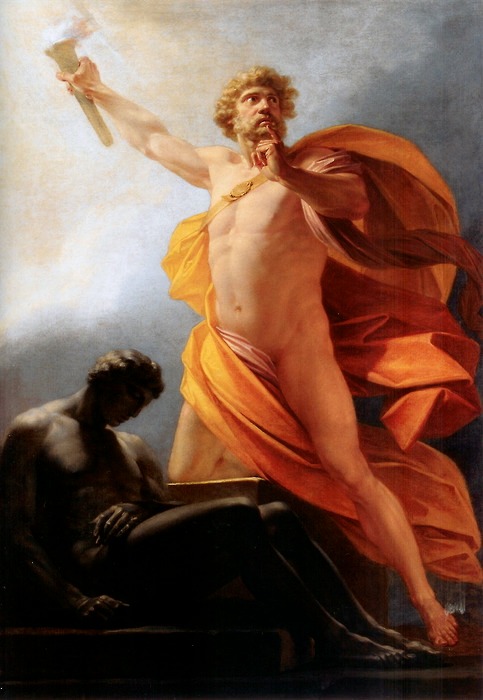Are You Prometheus or Zeus?

Do you know the myth of Prometheus and his argument with Zeus? I am reading 
I don't know if you can see yourself as Jason aboard the Argo ques ting for the Golden Fleece, or as Oedipus solving the riddle of the Sphinx. But I think we might divide all of us into two groups by deciding on which side we stand when it comes to artificial intelligence as "personified" by any robot with a human appearance and advanced artificial intelligence.
The myth that applies is the story of Prometheus and his argument with Zeus.
In Greek mythology, Prometheus, whose name means "forethought" is credited with the creation of man from clay, and also the one who defies Zeus by stealing fire and giving it to humanity.
To humans, his theft is heroic. Fire, perhaps our first technology, enabled progress, civilization and the human arts and sciences.

In Hesiod's version of the story of Prometheus and the theft of fire it is clear that Zeus withheld not only fire from humanity, but also "the means of life." Zeus feared that if humans had fire and all that it would lead them to, they would no longer need the gods.
Fry writes that “The Titan Prometheus made human beings in clay. The spit of Zeus and the breath of Athena gave them life. But Zeus refused to allow us to have fire. And I think fire means both literal fire – to allow us to become Bronze Age man, to create weapons and to cook meat. To frighten the fierce animals and become the strongest, physically and technically. But also the internal fire of self-consciousness and creativity. The divine fire. Zeus did not want us to have it. And Prometheus stole fire from heaven and gave it to man.”
If we think about a modern Prometheus, perhaps we can make him into a scientist who has created a very powerful android.
It is fitting that the word "android" was coined from the Greek andr-, meaning "man" (male, as opposed to anthr?p-, meaning human being) and the suffix -oid, meaning "having the form or likeness of. (We use "android" to refer to any human-looking robot, but a robot with a female appearance can also be referred to as a "gynoid.")
Our Prometheus the AI scientist is ready to give his android to the world. But his boss, Mr. Zeus, is opposed. What will happen when the android become sapient?" Zeus asks. Sapience is the ability of an organism or entity to act with judgment. "And what if these androids also become sentient?" Zeus asks. Sentience is the capacity to feel, perceive or experience subjectively.
Stephen Fry takes up that argument:
"In a hundred years time, we can guarantee there will be sapient beings on this earth that have been intelligently designed. You could call them robots, you could call them compounds of augmented biology and artificial intelligence, but they will exist. The future is enormous, it has never been more existentially transformative.
Will the Prometheus who makes the first piece of really impressive robotic AI – like Frankenstein or the Prometheus back in the Greek myth – have the question: do we give it fire? Do we give these creatures self-knowledge, self-consciousness? An autonomy that is greater than any other machine has ever had and would be similar to ours? In other words: shall we be Zeus and deny them fire because we are afraid of them? Because they will destroy us? The Greeks, and the human beings, did destroy the gods. They no longer needed them. And it is very possible that we will create a race of sapient beings who will not need us.”
So, are you like Prometheus wanting mankind to have these highly evolved robots? Or do you agree with Zeus that they will eventually destroy us?
Here is an excerpt concerning this idea from an interview Stephen Fry did in Holland.
(Full interview at https://dewerelddraaitdoor.bnnvara.nl/nieuws/de-twee-kanten-van-stephen-fry)

Comments
No comments